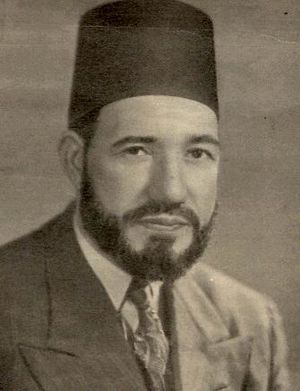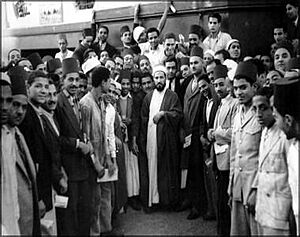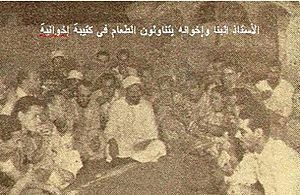Hassan al-Banna facts for kids
Quick facts for kids Sheikh Hassan Ahmed Abdel Rahman Muhammed al-Bannaحسن أحمد عبد الرحمن محمد البنا |
|
|---|---|
 |
|
| Religion | Sunni Islam |
| Alma mater | Dar al-Ulum |
| Personal | |
| Nationality | Egyptian |
| Born | 14 October 1906 Mahmoudiyah, Beheira, Egypt |
| Died | 12 February 1949 (aged 42) Cairo, Egypt |
| Cause of death | Gunshot wounds |
| Influenced | Muslim Brotherhood, Hassan al-Hudaybi, Mohammed Mahdi Akef, Mohammed Badie, Mahmoud Ezzat, Mohamed Naguib, Gamal Abdel Nasser, Anwar Sadat, Sayyid Qutb, Muhammad Mahmoud al-Sawaf, Abdel Moneim Saleh al-Ali al-Ezzi, Yusuf Azm, Mohammed al-Ghazali, Taqi al-Din al-Nabhani, Abdul Hamid al-Bilali, Wagdy Abd el-Hamied Mohamed Ghoneim, Abu Muhammad al-Maqdisi, Amin al-Husseini, Malcolm X,, Necmettin Erbakan, Ahmed Yassin, Abdel Aziz al-Rantisi, Yahya Ayyash, Yusuf al-Qaradawi, Rached Ghannouchi, Abdullah al-Mutawa, Jassim Muhalhal al-Yasin, Muhammad Surur, Mustafa al-Siba'i, Mohamed al-Awadi, Abdullah Yusuf Azzam, Mahfoud Nahnah, Zainab al-Ghazali, Labiba Ahmed, Yvonne Ridley |
| Founder and 1st General Guide of the Egyptian Muslim Brotherhood | |
| In office 1928–1949 |
|
| Preceded by | (Position established) |
| Succeeded by | Hassan al-Hudaybi |
Hassan Ahmed Abdel Rahman Muhammed al-Banna (Arabic: حسن أحمد عبد الرحمن محمد البنا), known as Hassan al-Banna (Arabic: حسن البنا), was an Egyptian schoolteacher and religious leader. He was born on October 14, 1906, and passed away on February 12, 1949.
He is most famous for starting the Muslim Brotherhood. This group became one of the biggest and most important organizations focused on bringing back Islamic values. Al-Banna believed that Islam was a complete way of life. He thought the Qur'an and Sunnah (the teachings of Prophet Muhammad) should guide everything.
He wanted to see Islamic principles used in government, business, and society. He also believed in helping people by improving public health. Al-Banna was against Western ideas that he felt went against Islamic values. He also opposed British imperialism in Egypt. He saw all Muslims as part of one big community, called the Ummah.
The Muslim Brotherhood aimed for peaceful changes to improve society. They focused on helping the community through good deeds. Al-Banna allowed a secret military part within the group. This part took part in the Arab–Israeli conflict. Hassan al-Banna was killed by the Egyptian secret police in 1949.
Contents
Early Life and Influences
Hassan al-Banna was born on October 14, 1906. His hometown was Mahmudiyya, a small town in the Nile Delta region of Egypt. His father, Sheikh Ahmed Abd al-Rahman al-Banna al-Sa'ati, was a respected religious scholar. He taught at a mosque and was a Hanbali imam.
His father greatly influenced Hassan's early life and learning. Sheikh Ahmed was known for his work on the teachings of Imam Ahmad ibn Hanbal. This work helped him connect with other Islamic scholars. These connections later helped Hassan when he moved to Cairo.
As a young person, Hassan al-Banna was also inspired by Rashid Rida's magazine, Al-Manar. He was also influenced by Sufism, a spiritual side of Islam. He attended weekly gatherings and was part of a Sufi group.
Hassan first learned about Egyptian politics during the Egyptian Revolution of 1919. He was only thirteen years old then. He took part in protests and helped create youth groups that wanted reforms. Even though his family was not rich, they were well-respected in their town.
Education and Ideas
In Mahmudiyya, al-Banna studied at the village mosque. He also received private lessons from his father. Later, he studied in Cairo for four years at Dar al-‘Ulum. This school trained future teachers in modern subjects. It was not a very traditional school.
While studying in Cairo, al-Banna noticed changes in city life. He felt that many young, educated people were moving away from Islamic ways. He also disliked Egypt's liberal politicians. During this time, he discovered the writings of Rashid Rida. Rida's ideas helped al-Banna understand how to fix the problems he saw in Egypt.
Al-Banna often visited the Salafiyya bookstore. He also attended lectures by Rashid Rida. For al-Banna, Rida's works offered religious guidance. They helped him address the issues he observed in Egyptian society.
Founding the Muslim Brotherhood
Al-Banna learned that the Ottoman Caliphate was abolished in 1924. This event deeply affected him. Even though the caliphate had little power, he saw its end as a great loss for Muslims. He called it a "declaration of war against all shapes of Islam."
After finishing his studies in 1927, al-Banna became a primary school teacher. He taught in Ismailia, a city where the Suez Canal headquarters was located. Foreign influence was very strong there. Al-Banna became worried about British cultural colonialism. He felt that attempts to modernize Egypt were harming Islamic principles.
Many Egyptians were also unhappy with the Wafd government. They felt it was too moderate and focused too much on secularism. Hassan al-Banna met many important thinkers in Cairo. He also wrote letters to Rashid Rida.
Al-Banna developed ideas that combined the views of past Islamic thinkers. He believed that moral decline was the main reason for society's problems. He felt that simply talking in mosques was not enough. He started preaching in coffee houses in Ismailia. His speeches attracted many young people.
In March 1928, six workers from the Suez Canal company came to al-Banna. They complained about unfair treatment of Muslims by foreign powers. They asked al-Banna to be their leader. They wanted to work for Islam through Jihad and bring back Islamic unity. This is how the Muslim Brotherhood began. Its members promised to be "soldiers in the call to Islam."
At first, the Muslim Brotherhood was one of many small Islamic groups. These groups aimed to encourage personal faith and do good deeds. By the late 1930s, the Muslim Brotherhood had branches in every Egyptian area.
Ten years later, the group had 500,000 active members in Egypt. It also had many supporters in other countries. This growth happened especially after al-Banna moved the group's main office to Cairo in 1932. Al-Banna's strong leadership and clear ideas were key to this success.
In Ismailia, al-Banna preached in coffee houses, which was unusual at the time. He avoided arguments about small religious points. He was upset by the clear signs of foreign control in Ismailia. He saw British military camps and foreign-owned businesses. He also saw the rich homes of foreign workers next to the poor homes of Egyptian workers.
Working for Change
Al-Banna worked to bring about changes through building organizations. He was very active at the local level and used mass communication. He created a large movement with clear structures. It had groups for farmers, workers, and professionals. There were also units for spreading their message, connecting with the Islamic world, and handling media.
Al-Banna stated that Islam was the only complete system that could solve modern problems. He urged Muslims to reject Western ideas. He wrote that the Islamic Revolution had already brought freedom, equality, and justice 1300 years before. He said it applied these ideas to daily life and added spiritual values.
Al-Banna used existing social groups, like those around mosques, to connect the Muslim Brotherhood to Egyptian society. This mix of old traditions with a modern structure was a big reason for his success. The Brotherhood also had its own businesses, clinics, and schools. Members were part of small groups called usar ("families").
The support provided by the Muslim Brotherhood helped members feel very loyal. It also attracted new people. The movement offered services and a structure that helped people live according to Islamic principles.
Al-Banna's message, based on Islam, covered many topics. These included colonialism, public health, educational policies, and social inequalities. He also spoke about pan-Islamism, nationalism, and the conflict in Palestine. By talking about issues that many people cared about, al-Banna attracted members from all parts of Egyptian society. He was also active in resisting British rule in Egypt.
Al-Banna told his followers that preparing for jihad against colonial powers was important. He said that Muslims were being ruled by non-Muslims and their lands were being taken. He believed it was everyone's duty to prepare for this struggle.
The Muslim Brotherhood and Palestine
One important achievement of the Muslim Brotherhood was its involvement in the 1936–1939 Arab revolt in Palestine. The Brotherhood started a campaign to support Palestine. This helped make the issue important to many Muslims. They raised money, mostly from ordinary people, not just the rich.
They also organized special prayers for Palestinian nationalists. They held political meetings and shared information. Even though the Palestinian Revolt was stopped, the Muslim Brotherhood's efforts helped make the Palestinian issue a concern for all Arabs in the Middle East.
When Rashid Rida passed away in 1935, his Al-Manar magazine stopped. In 1939, Hassan al-Banna brought Al-Manar back. He used it to promote the Muslim Brotherhood's ideas and carry on Rashid Rida's legacy.
Some historians, like Steven Carol, have claimed that the Muslim Brotherhood received money from Nazi Germany. However, the Muslim Brotherhood's official publication, Ikhwan Wiki, denies this. It states that Hassan al-Banna never took money from Nazi Germany or the United Kingdom. They say he wanted the group to be independent. Ikhwan Wiki also says that Nazi ideas of racism and empire go against Islamic beliefs. Hassan al-Banna himself wrote that the extreme nationalism of Nazi Germany and Fascist Italy was a "bad idea" with "not the slightest good" in it.
Final Days and Assassination
Between 1948 and 1949, the relationship between the Egyptian government and the Muslim Brotherhood became very difficult. This was after the group sent volunteers to fight in the 1948 Arab–Israeli War. The government was worried about the Brotherhood's growing power. There were also rumors that the group was planning to overthrow the government.
In December 1948, the Prime Minister, Nokrashy Pasha, banned the organization. The Brotherhood's money and property were taken, and many members were put in jail. After a student member of the Brotherhood killed Nokrashy Pasha, Al-Banna spoke out. He condemned the killing and said that violence was not acceptable in Islam.
On February 12, 1949, al-Banna was supposed to meet with a government official in Cairo. The official never showed up. As al-Banna and his brother-in-law waited for a taxi, two men shot them. Al-Banna later died from his injuries. Many people believed that King Farouk and his secret police were behind the killing. His funeral was attended mostly by women, as police prevented men from coming.
Family Life
Hassan al-Banna's daughter, Wafa al-Banna, married Said Ramadan. He later became an important leader of the Muslim Brotherhood. Their two sons, Tariq Ramadan and Hani Ramadan, are well-known Islamic scholars and educators today. Hassan al-Banna's younger brother, Gamal al-Banna, was a more open-minded scholar who supported Islamic reforms.
Writings and Legacy
Hassan al-Banna wrote a lot. He wrote over 2000 articles and many books. One of his important books is his autobiography, Mudhakkirât al-da'wa wa al-dâ'iya. This title means Remembrances of Preaching and of a Preacher.
See also
 In Spanish: Hasan al-Banna para niños
In Spanish: Hasan al-Banna para niños
- History of the Muslim Brotherhood in Egypt
 | Roy Wilkins |
 | John Lewis |
 | Linda Carol Brown |



